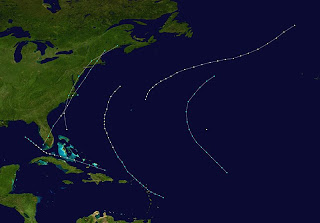 |
| 1861 Hurricane Season |
Looking through the records, it seems that a similar hurricane to Irene occurred 150 years ago. On the heels of the Port Royal Expedition, Hurricane Eight, better known as the "Expedition Hurricane," severely impacted the timeline for the Union thrust into the vital Confederate stronghold.
According to the National Hurricane Center, the three day storm was the last of the season. "Hurricane Eight" began on the southwestern tip of Florida and climbed up the east coast. Not unlike Irene, the storm made landfall along the Outer Banks of North Carolina as a CAT 1, slowly diminishing speed up the coast before downgrading to a tropical storm by nightfall on 2 November. At its height, the hurricane reached winds approaching 80 mph.
The storm caused many problems for the United States Navy preparing for the expedition to capture the Confederate center along the Port Royal Sound. Although the earliest storm warning occurred in late October while the fleet assembled, the most devastating impact came on the 2nd.
Most of the ships involved in the storm were spared, many having to unload precious cargo to stay afloat. One ship which did not fair well, the transport Governor, lost seven Marines during a fateful rescue by the USS Sabine's crew. Writing to Blockade commander Samuel F. Du Pont, Southern Division Marine Corps Commander JNO. George Reynolds communicated the harrowing wind, waves, and rescue:
"The sea was running so high, and we being tossed so violently, it was deemed prudent to slack up the hawser and let the Governor fall astern of the frigate with the faint hope of weathering the gale till morning. All our provisions and other stores, indeed every movable article, were thrown overboard, and the water casks started to lighten the vessel. From half past 3 until daybreak the Governor floated in comparative safety, notwithstanding the water was rapidly gaining on her. At daybreak preparations were made for sending boats to our relief although the sea was running high, and it being exceedingly dangerous for a boat to approach the guards of the steamer. In consequence the boats laid off and the men were obliged to jump into the sea, amid were then hauled into the boats. All hands were thus providentially rescued from the wreck with the exception, I am pained to say, of 1 corporal and 6 privates, who were drowned or killed by the crush or contact of the vessels. Those drowned were lost through their disobedience of orders in leaving the ranks, or abandoning their posts."
Despite the loss of ship and life, the fleet of 77 ships went on to capture the sound at the Battle of Port Royal. Stay tuned in November for more information on that specific sesquicentennial battle.
0 comments:
Post a Comment